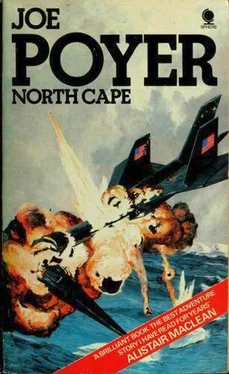“We’ll be here,” he said: with considerably more confidence than he felt at the moment. The seas were increasing and the stabilizers were just about useless in the heavy waters. He noted that Folsom, bent over the console, had just ordered the RPM’s on the engines stepped up to furnish stabilizing air around the hull.
“We are going to start quartering a fifty-mile circuit in fifteen minutes.” Out of the corner of his eye he saw the white flicker of another wave break mast-high and come crashing down against the forward ports. “So we’ll be here.”
“Good…” The transmission garbled and quickly cleared. “Say again,” Larkin requested.
“Good… take it… easy… down there… see you tomorrow.”
“Right, clear.” Larkin stubbed his cigarette out and got up from the console. He waved to the marine and ordered Folsom to stand down from security. He thought for a moment, leaning against the console, feeling again the crushing weight of responsibility come down over him just as it had the night the destroyer sheared through the bow, or that afternoon off the North Vietnamese coast. He took a deep breath and shook his head reluctantly, then beckoned Folsom to join him at the plotting table, and quickly explained that they would stay on station for another twenty-four hours. For the next ten minutes they discussed the advantages and disadvantages of various courses that would allow them to take the brunt of the storm in the easiest manner possible. Finally, they settled on a straight run to the northeast that would bring them abreast of the North Cape, some one hundred miles north by 1100 hours. Both were convinced that it would be better to ride directly into the teeth of the gale now, before it unleashed its better than one-hundred-mile-an-hour winds, as it was expected to do late tomorrow. They Would then be able to run before the storm, arriving back on station at 1700 hours. This allowed a onehour lead time for any unexpected delays or heavier seas than Folsom picked up the maps and spread them out on the chart amble. He drew a fine line in red between their present position and the expected turn-around point north of the Cape.
He pointed with the pencil at the exposed position. “Actually it might be better to come farther west to bring us under the lee of the Cape.” He waited expectantly for Larkin’s answer.
Larkin shoved his cap back and rubbed his forehead. “Ordinarily, yes. But in this weather, I just don’t trust these waters. They shoal too damned easily and the average depth runs less than ten fathoms. If we pick up any more ice, and it looks like we’re going to, we’d be in big trouble. No, I think I’d prefer to make the turn in the open sea and take my chances with the wind and waves.”
“You’re the boss.” Folsom nodded and bent over the table again, to — begin the intricate task of plotting a course that would take them into the teeth of eighty-to ninety-knot headwinds that had a tendency to quarter unexpectedly. Even with the latest in inertial gyroscopes aboard, he still had a tricky problem in navigation on his hands — to take them a total of 223 nautical miles in twenty-four hours and bring them back to a starting point less than half a mile wide, all with terrible winds and towering waves that would combine to push the battle cruiser in a myriad of directions during the voyage. Larkin nodded to himself and turned away, satisfied that the ship was in capable hands with Folsom at the helm. He went below for breakfast.
Teleman fell off to the north and west at a leisurely pace for the refueling point. Beneath him, the storm-filled Arctic Ocean gave way to the frozen wastes of the Great Ice Barrier, now at its farthest point of advance south in late March, well past the Norwegian outpost of Bear Island. Only the Great North Atlantic Drift, still retaining some of the slightly warmer waters of the Gulf Stream, kept the vast plateau of ice from moving farther south toward the European mainland. Crumpled and tom, the jagged edges of ice near the rim, twisted and warped by the pressure of billions of tons of slowly, insidiously moving ice from its vast interior, threw up blinding sheets of minute ice crystals that filled the frozen air to a height of twenty feet with fiery, needle-sharp spicules that screamed through the pressure ridges and hummocks, which carved them into tortured shapes. A frozen hell from insanity’s worst imaginings.
Teleman climbed slowly to one hundred thousand feet and held. Here the air, what little there was of it, was quiet, knifing past the razor-sharp leading edges of his half-extended wings as he flew westward, overtaking the sun. After another hour of flight, the trailing edge of the storm appeared low on the horizon, and within minutes he could see the gray shape of the ice surface below. The low Arctic sun broke suddenly through the edge of the cloud cover that reached westward to Greenland and flooded a two-dimensional pyramid of burnished ice with blood. The sunlight shining through the small observation slit to his right carried no warmth, only the cold glare of death. He flew on for another twenty minutes, lulled by the muffled sound of the engines working in a throttled-down ramjet mode and by the slow infusion of relaxant drugs seeping into his bloodstream: He was eight hundred miles north of Greenland when the radar contact panel lit suddenly. Instantly the computers responded and the PMC injected a neutralizer followed by a timed release of an Adrenalin derivative that jumped his heart rate to — double the normal rate of 72 beats per minute, with a correspondingly increased respiration ratio. Teleman hunched forward, taking in the full significance of the radar signal and the digital readout that was feeding closing range and speed into the display. At the same time, his body, acting in a blur of motion — a controlled berserk reaction — took over the aircraft and prepared for a series of evasive actions. Teleman knew that the blip on the radar screen could only be the refueling aircraft climbing up to meet him. But this made no difference to his reflex patterns. Friend or foe, he repeated the drill precisely as laid down in his subconscious by intensive training. The digital panel displayed a “friendly contact” signal and one second later flashed the recognition pattern for the refueling tanker.
The computers stepped down the flow of reaction drugs and Teleman relaxed slightly. He was now in full control of the aircraft and approaching the tanker, still two hundred miles distant, at a closing rate of better than three thousand miles an hour. The radar screen indicated that the craft was a KB-58 tanker. His speed was close to Mach a, near his limit, and Teleman’s was Mach 2.1. The tanker did not slack his speed and Teleman barely caught a glimpse of him as he pulled past and below his nose in a tight turn to take up his station ahead and above.
Only then did Teleman cut back his speed to match that of the KB-58. The boom was out of the tanker and he maneuvered carefully, bringing the aircraft up and just off the boom. Teleman watched it waver in the nebulous slipstream and, judging the right moment, increased power slowly to slip the nozzle into the housing aft of the cockpit. The maneuver was all performed by Teleman. The KB-58 pilot merely brought his straining aircraft up to the one-hundred-thousand-foot altitude for which it had been specially modified with TF-30 fanjets and outboard ramjet wing-tip engines and held her steady. The juggling for position, too precise even for the most advanced computer-controlled instrumentation, was performed by Teleman, who depended upon the extended reach that the controlling drugs provided his body.
When he felt the sharp bang of the nozzle slamming home and saw the safety light go on, he signaled the KB-58 and high-pressure pumps forced the two-hundred-thousand-pound cargo of liquid hydrogen into the — cryogenic tanks. Eight minutes later the refueling process was complete, and he broke away. Speed was of the essence during these midair refuelings, as both aircraft were totally helpless. Due to the advanced electronic detection and countermeasure equipment carried by Teleman, it was not likely that hostile aircraft would have the capability to track and ambush the two planes, but then in this operation nothing had been left to chance. Once, nearly twelve years before, it had been, and the one in a million gamble had occurred — with disastrous results. The United States Government was determined that it would not happen again. The KB-58, gleaming and sharply defined in the reddish light, dropped down and pulled ahead. Teleman answered the cocky, rocking wings and watched as the KB-58 pulled into a wide turn to the south that would take it back to its base at Thule. Then he settled into an orbiting pattern and keyed in the contents of the taped orders that Larkin had transmitted from the ship. For long minutes, Teleman sat silently, waiting for his next command and absorbing the message encoded on the tape while the aircraft described a vast orbit nearly fifty miles in diameter. When he finished, he sat for a few,moments thinking that his orders amounted to international blackmail on a grand scale.
Читать дальше












